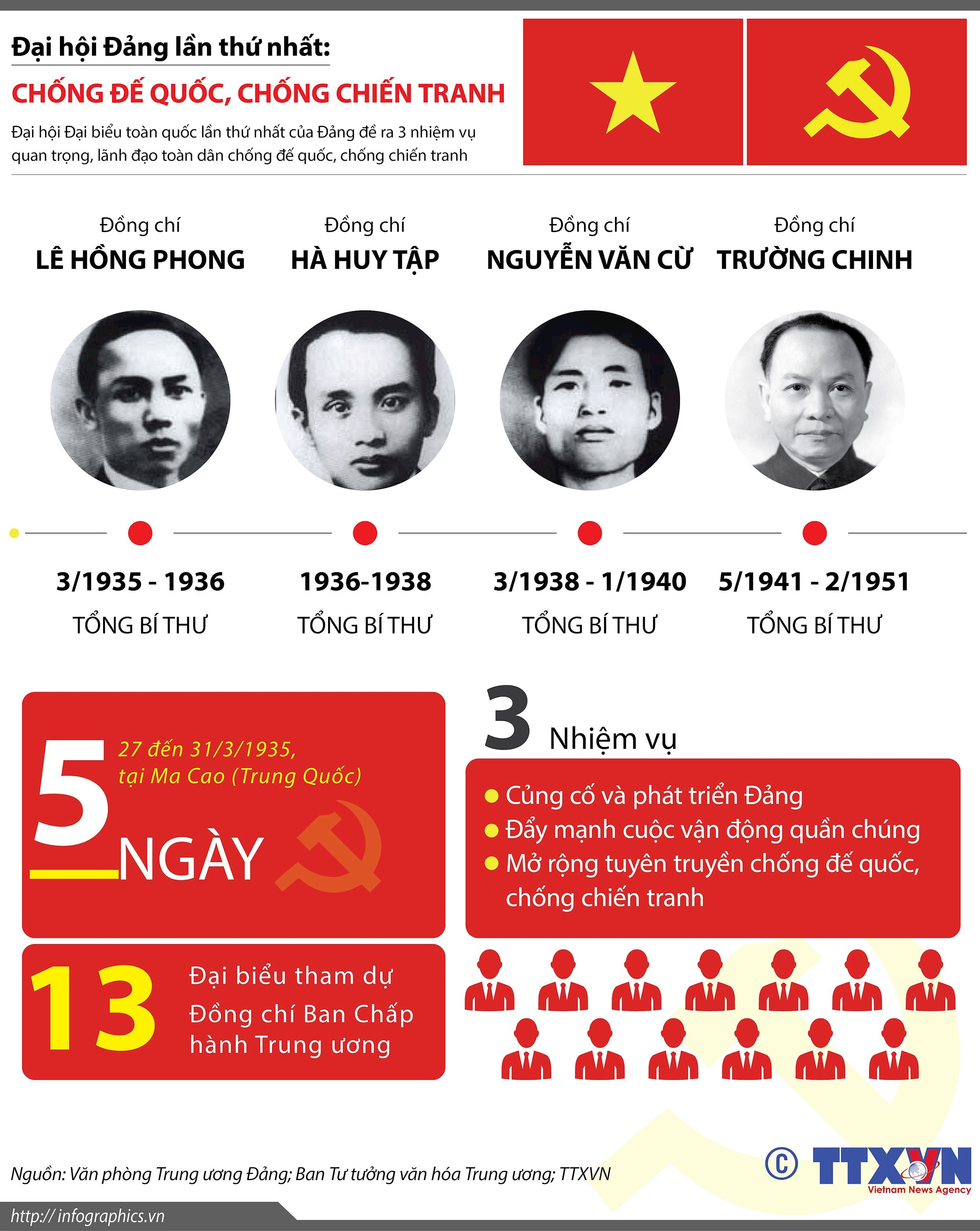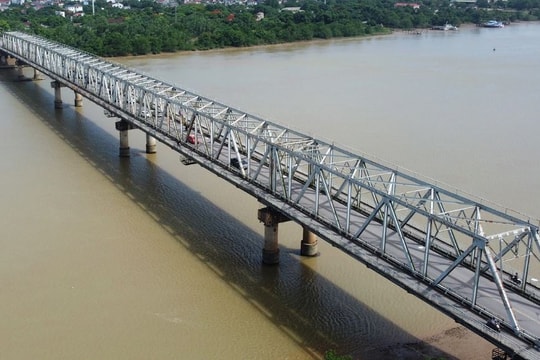The First Party Congress: Anti-imperialism, anti-war
The First National Congress of the Party set out three important tasks: leading the entire people to fight against imperialism and war. The First Party Congress lasted for a long time, and comrade Truong Chinh, after his term as General Secretary (1941-1951), was elected by the Party Central Committee in 1986 to hold the position of General Secretary to replace comrade Le Duan, who passed away on July 10, 1986.
FIRST PARTY CONGRESS
Time:March 27 to 31, 1935
Location:Macau, China
Number of party members in the country: 600
Number of delegates attending the Congress: 13
Congress elected:
- Central Executive Committee: consists of 9 official members and 4 alternate members.
- General Secretary: ComradeLe Hong Phong

GENERAL CONTEXT:
The international communist and workers' movement continued to develop in favor of the struggle of colonial peoples.
The great achievements in all aspects of socialist construction in the Soviet Union had a huge impact on the revolutionary movement in colonial countries.
Capitalist countries sought to overcome the crisis in two fundamentally different ways: fascizing the political regime, preparing for war (Germany, Italy, Japan) and carrying out socio-economic reforms (England, France, America). Fascism was a threat to world peace and security.
In Indochina, the workers' movement gradually recovered. People from urban and rural areas participated in the struggle in many forms such as student strikes, merchant strikes, and farmers' anti-tax demonstrations.
Party organizations gradually recovered after the White Terror.
ANTI-IMPERIALISM, ANTI-WAR
The First Congress of the Party assessed the world and domestic situation, highlighted the successes of the Soviet Union and the revolutionary movements of working people in many countries around the world, and affirmed that socialism is a historical inevitability.
The Congress assessed that the Party's organizational system had been restored and the revolutionary movement had made progress. The struggles of the masses over the past two years had achieved victories to varying degrees.
The Congress outlined three main tasks of the Party in the immediate future:
+ Strengthening and developing the Party;
+ Win over the masses;
+ Against imperialist war.
For the first time, the Congress issued a series of extremely important Resolutions to gather forces and build a mass movement: Resolutions on mobilizing workers, farmers, soldiers, women, and youth; on anti-imperialist alliance work; on work among ethnic minorities; on self-defense and red relief teams.
The Congress adopted the Party Charter and the charters of the Party's mass organizations.
The Congress elected the Party Central Committee. Comrade Nguyen Ai Quoc was elected as the Party's representative at the Communist International. Comrade Le Hong Phong was elected as the Party's General Secretary. In July 1936, Comrade Ha Huy Tap was elected as the Party's General Secretary. In March 1938, Comrade Nguyen Van Cu was elected as the Party's General Secretary. In May 1941, the Party Central Committee Conference held in Pac Bo (Cao Bang) elected Comrade Truong Chinh as the Party's General Secretary.
The First National Congress of the Party was an important historical event, marking the victory of the struggle to protect and restore the Party organization system from the Central to local levels, unifying the revolutionary movement under the leadership of the Central Party, creating conditions for the revolutionary movement to enter a new period of struggle.
DOMESTIC EVENTS
1931-1935: In the North there were 551 workers' struggles.
1934: Establishment of the Overseas Command Committee of the Indochinese Communist Party headed by comrade Le Hong Phong.
Late 1934 and early 1935: The regional committees of Cochinchina, Annam, and Bac Ky were successively re-established.
1934:Comrade Nguyen Ai Quoc went to the Soviet Union to study at the Lenin International School.
1935:On the occasion of the anniversary of the Party's founding and the International Labor Day, in many provinces and cities, red flags with hammer and sickle appeared, leaflets demanding salary increases, reduced working hours, tax abolition, support for the Soviet Union, and the overthrow of French imperialism...
INTERNATIONAL EVENTS
30/1/1933:Hitler (head of the Nazi party) became Chancellor of Germany, opening the dark ages of Germany.
1934: The Soviet Union joined the League of Nations.
7/1934:The Socialist Party and the French Communist Party formed the United Front against fascism in France.
July 25 to August 20, 1935:The 7th Congress of the Communist International held in the Soviet Union identified the immediate enemy, the task of struggle, and decided to establish a broad People's Front against fascism, against war, demanding freedom, democracy, and preserving peace. The delegation of the Indochinese Communist Party led by comrade Le Hong Phong attended with 65 delegations of Communist Parties around the world. Leader Nguyen Ai Quoc, who was studying and researching at the Lenin International School, was invited to attend.
10/1935: The Italian fascist government led by Mussolini invaded Ethiopia.




